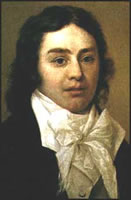![]()
Samuel Taylor Coleridge
Coleridge makes the notion of Hamlet's excessive thought into a pathology.
|
If there be an overbalance in the contemplative faculty, man becomes the creature of meditation, and loses the power of action. Shakespeare seems to have conceived a mind in the highest degree of excitement, with this overpowering activity of intellect: and to have placed him in circumstances, where he was obliged to act on the spur of the moment. Hamlet, though brave and careless of death, had contracted a morbid sensibility from this overbalance in the mind, producing the lingering and vacillating delays of procrastination; and wasting in the energy of resolving, the energy of acting. - Samuel Taylor Coleridge, Coleridge's Writings on Shakespeare, Capricorn, New York, 1959. pp. 164-5. Hamlet's character is the prevalence of the abstracting and generalizing habit over the practical. He does not want courage, skill, will, or opportunity; but every incident sets him thinking; and it is curious, and at the same time strictly natural, that Hamlet, who all the play seems reason itself, should be impelled, at last, by mere accident to affect his object. - p. 140. |
 |
| HAMLET: Ay, madam, it is common. Here observe Hamlet's delicacy to his mother, and how the supression prepares him for the overflow in the next speech, in which his character is more developed by bringing forward his aversion to externals, and which betrays his habit of brooding over the world within him, coupled with a prodigality of beautiful words, which are half embodyings of thought, and are more than thought, and have an outness, a reality sui generis, and yet retain their correspondence and shadowy affinity to the images and movements within.... This taedium vitae is a common oppression on minds cast in the Hamlet mould, and is caused by disproportionate mental exertion, which neccessitates exhaustion of bodily feeling. - Coleridge, lectures, in The Romantics on Shakespeare. p.316. |